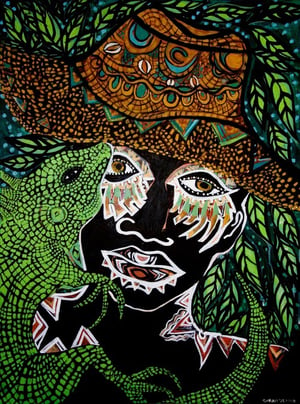The Community, Liberation, Indigenous, and Eco-Psychologies (CLIE) M.A./Ph.D. specialization at Pacifica brings together scholars who pursue vocations oriented toward social and environmental justice. These efforts are brought together in our annual publication, Hearing Voices. We'd like to introduce you to the work of Katie Robinson, our 2nd year CLIE student, poet, and sexuality educator.
 On Queerness As Praxis
On Queerness As Praxis
By Katie Robinson
If part of decoloniality is about naming what hurts and why, equal part must also be about screaming what feels good and why. Queers raised in a western colonial and neocolonial context, in all
our vibrant multiplicity, have always been good at this, having continually broken from, acted against, and thrived outside of a colonial expectation and construct based in erotophobia. Many of us have decided to live and build community around a full bodied, “yes, this!” in the direction of pleasure as an authentic self and with others.
This is a breaking that has cost some of us our families, our spirituality, and our safety, especially those of us who are transfeminine, non-binary, and at the intersections of other identities resisting oppression. It has also given some of us access to a “radical self-possession” (Alexander, 2005, p. 282), and can serve as an abundant resource as many more of us, queer and not queer, seek to break and break from other systems born from coloniality.
Queerness, for some, is a breaking that begins as intuition, as a question, and is sustained by the radical belief that there may be pleasure on the other side of a potentially painful and dangerous transition and/or coming out process, an unsafety which ultimately may accompany us, as communities resisting oppression, for the rest of our lives.
For many of us, we believe more in something we may never have never experienced, more than we believe in the danger of our current or future situations. We possess a deep trust that we will still be holding onto enough of ourselves to exist after we break. The idea that we could survive after a gender transition, for example, necessitates a faith in queerness and in our Erotic, intuitive knowledge that we will be caught and affirmed. This movement from intuitive knowledge into risky and radical action in the name of a pleasurable otherwise is queer praxis. Many of us come out, cut our hair, then come out again, transition, try new genders on, then take them off, all in reflexive pursuit of nothing other than our most authentic, free, and pleasure-able selves. We know, intimately, that our selves of this moment may hardly be able to imagine our selves of tomorrow. We also know that the transition into a yet-unknowable body may give us access to more freedom to feel good, not less.
We invite you to read the rest of Katie's article in Hearing Voices. CLIE is now enrolling for Fall, and we encourage you to join us here.
*Art: ODE NA FLORESTA, Sarah Dearie



